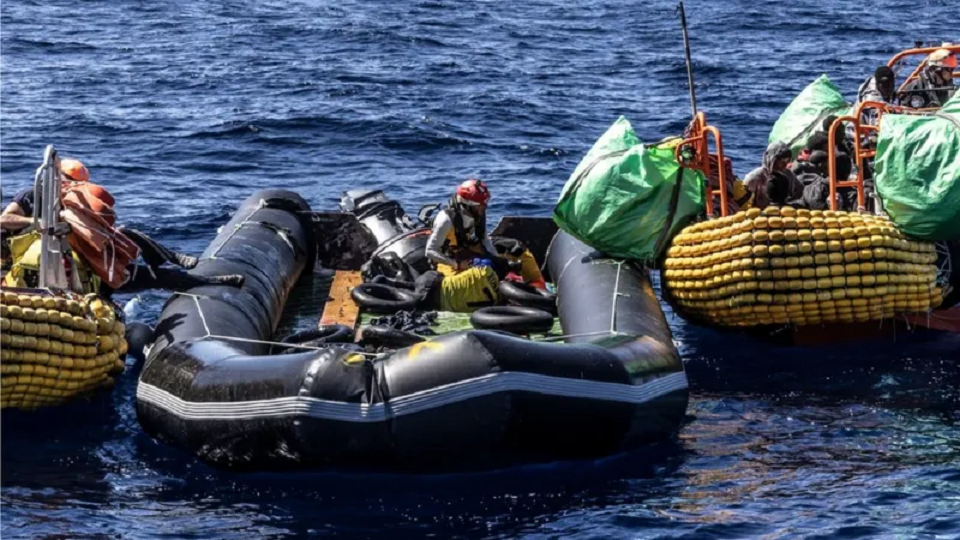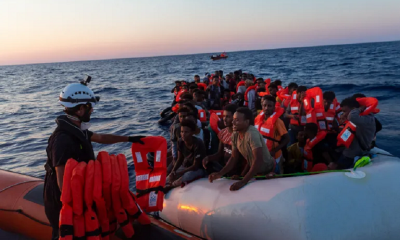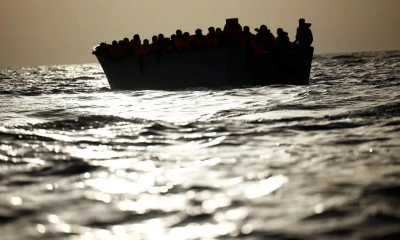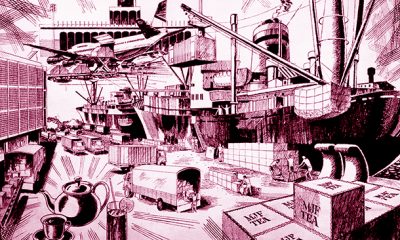Latest News
60 migrants die in dinghy in Mediterranean, survivors say

At least 60 migrants have died after a rubber dinghy ran into trouble in the Mediterranean Sea, according to survivors.
The 25 survivors were picked up by the Ocean Viking, a vessel operated by the humanitarian group SOS Méditerranée.
They told their rescuers that they had set off from Zawiya on the Libyan coast several days before being rescued. The engine of the dinghy broke down after three days, leaving the boat adrift without food or water.
The survivors said that the victims included women and at least one child. They are believed to have died from dehydration and hunger, not drowning.
SOS Méditerranée said the Ocean Viking team had spotted the dinghy, which set off last Friday, with binoculars on Wednesday and had staged a medical evacuation in co-operation with Italian coast guards.
It said the survivors were “in very weak health condition” and were all under medical care. Two of them, who were unconscious and in critical condition, had been flown to Sicily by helicopter for further treatment, the group added.
The remaining 23 are still on board the Ocean Viking, along with more than 200 other migrants who were rescued from two other boats.
The vessel is heading for the port of Ancona, about four days away, but the team has requested a closer port of safety.
“The people who were on the boat in distress, lost at sea for almost a week, went out of water and food very quickly, according to the survivors,” said an SOS Méditerranée spokeswoman on board the ship. “People died along the way. I met a man who lost his wife and one-and-a-half-year-old baby. The baby died the first day, the mother the fourth day. They were from Senegal and had been in Libya for more than two years.”
The EU’s border agency Frontex told the BBC that it raised the alarm last Friday after spotting a vessel with more than 50 people onboard near the coast of Libya. It did not specify if it was the same rubber dinghy picked up by the Ocean Viking. Frontex says one of its aircraft out on a routine trip spotted the vessel within Libya’s rescue zone and so alerted the Libyan authorities.
The EU agency says it also issued a mayday alert to all other boats in the area to help the vessel – and contacted Italian and Maltese rescue coordination centres too.
Frontex says its aircraft needed to return to dry land to refuel and it didn’t know what happened to the vessel after the initial observation.
The International Organisation for Migration (IOM) said last week that 2023 was the deadliest year for migrants since records began a decade ago, with at least 8,565 people dying on migration routes worldwide. The UN agency said the figure was 20% up on the year before.
Its report found that the Mediterranean crossing continued to be the most dangerous journey, with at least 3,129 deaths and disappearances during 2023 – the highest toll since 2017.
Julia Black, a IOM Project manager, told the BBC that “not as many people are crossing now but almost as many people are dying”. “With the 300 deaths recorded this year so far that’s nearly the same as last year, so I am greatly concerned that we are going to see a record-breaking year in terms of the number of deaths in the Mediterranean.”
(BBC)
Latest News
Minister of Foreign Affairs pays his last respects to Pope Francis

Minister of Foreign Affairs, Foreign Employment and Tourism, Vijitha Herath represented Sri Lanka at the funeral of Pope Francis on Saturday [26]
Latest News
Showers about 100 mm are likely at some places in Sabaragamuwa, Central, Uva, Eastern and North-central provinces and in Vavuniya, Mullaittivu and Kurunegala districts

WEATHER FORECAST FOR 27 APRIL 2025
Issued at 05.30 a.m. on 27 April 2025 by the Department of Meteorology
The Inter-tropical Convergence Zone (where winds from the Northern Hemisphere and Southern Hemisphere converge) affects the island’s weather.
Misty conditions can be expected at some places in Central and Uva provinces during the morning.
Several spells of showers may occur in Western province and in Puttalam, Mannar, Jaffna, Galle and Matara districts in the morning while showers or thundershowers will occur at most places of the island during the afternoon or night. Heavy rain fall about 100 mm is likely at some places in Sabaragamuwa, Central, Uva, Eastern and North-central provinces and in Vavuniya, Mullaittivu and Kurunegala districts.
The general public is kindly requested to take adequate precautions to minimize damages caused by temporary localized strong winds and lightning during thundershowers.
Latest News
Results of 2024 GCE Advanced Level examination released

The Department of Education has announced that the results of the 2024 General Certificate of Education Advanced Level Examination have been released online, and can be viewed on : www.doenets.lk
-

 Features5 days ago
Features5 days agoRuGoesWild: Taking science into the wild — and into the hearts of Sri Lankans
-

 News5 days ago
News5 days agoOrders under the provisions of the Prevention of Corruptions Act No. 9 of 2023 for concurrence of parliament
-

 Features6 days ago
Features6 days agoNew species of Bronzeback snake, discovered in Sri Lanka
-

 News4 days ago
News4 days agoProf. Rambukwella passes away
-

 News6 days ago
News6 days agoPhoto of Sacred tooth relic: CID launches probe
-

 Opinion5 days ago
Opinion5 days agoSri Lanka’s Foreign Policy amid Geopolitical Transformations: 1990-2024 – Part IX
-

 Features6 days ago
Features6 days agoSri Lanka’s Foreign Policy amid Geopolitical Transformations: 1990-2024 – Part VIII
-

 Features2 days ago
Features2 days agoThe Truth will set us free – I




















